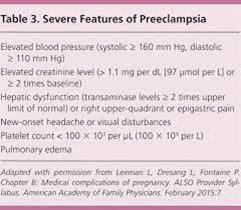A nurse is caring for a client who is at 32 weeks gestation and has a history of hypertension. Which of the following statements by the client should the nurse report to the provider?
"My ankles get swollen after standing at work."
"My gums bleed when I brush my teeth."
"I have constant pain in the middle of my upper abdomen."
"I feel dizzy when I lay flat on my back.
The Correct Answer is C
Choice A rationale:
Ankle swelling can be a common symptom of pregnancy and is not necessarily indicative of a complication.
Choice B rationale:
Gums can become more sensitive during pregnancy, leading to bleeding while brushing teeth. This finding is common and not necessarily indicative of a complication.
Choice C rationale:
Constant pain in the middle of the upper abdomen can be a sign of preeclampsia, a serious pregnancy complication that requires prompt medical attention.
Choice D rationale:
Feeling dizzy when lying flat on the back (supine hypotension) can be a common discomfort during pregnancy due to pressure on the vena cava. However, it does not necessarily indicate a complication in this context.

Nursing Test Bank
Naxlex Comprehensive Predictor Exams
Related Questions
Correct Answer is A
Explanation
Choice A rationale:
Postoperative pain management is crucial for the client's comfort and recovery.
Choice B rationale:
Excoriated folds of the client's panniculus might be related to skin irritation and can be addressed without immediate provider notification.
Choice C rationale:
Hypoactive bowel sounds can be expected after surgery and might not require immediate reporting.
Choice D rationale:
Urine output of 80 mL in the past hour might be influenced by various factors and is not as high a priority as severe pain.
Correct Answer is ["B","C","D"]
Explanation
Choice A rationale:
Asking the client to explain what she is hearing may not be helpful, as the client's perception of the hallucinations may not match reality.
Choice B rationale:
Conveying empathy is important to establish a therapeutic relationship and provide emotional support.
Choice C rationale:
Encouraging the client to listen to music through headphones can help distract from auditory hallucinations.
Choice D rationale:
Speaking simply and clearly when communicating helps the client understand and process information more effectively.
Choice E rationale:
Using therapeutic touch might not be appropriate for all clients and should be based on the client's preferences and comfort level.
Whether you are a student looking to ace your exams or a practicing nurse seeking to enhance your expertise , our nursing education contents will empower you with the confidence and competence to make a difference in the lives of patients and become a respected leader in the healthcare field.
Visit Naxlex, invest in your future and unlock endless possibilities with our unparalleled nursing education contents today
Report Wrong Answer on the Current Question
Do you disagree with the answer? If yes, what is your expected answer? Explain.
Kindly be descriptive with the issue you are facing.
